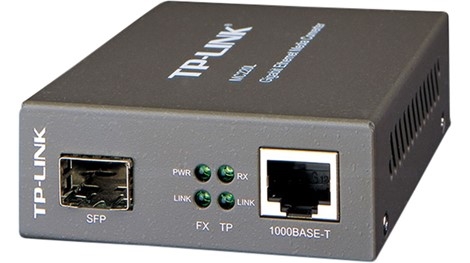Table of Contents Show
In today’s world, it’s almost impossible to imagine life and work without an Internet connection. And when it comes to business purposes, Ethernet is your best bet if you need a fast and reliable connection.
A wireless connection might be convenient and simple to install. Still, it has lower levels of reliability and safety than a wired network.

But there’s a catch with copper-based Ethernet. It has a distance limitation of only 100 meters. That’s enough for home use and small-scale companies. But growing businesses trigger the need for higher bandwidths and longer distances.
Some hardware solutions (view their website) can help you extend your wired network. These are media converters and Ethernet extenders.
These devices look alike, although they are two very different products. Yet, both are convenient and cost-effective options. So deciding which one suits your needs can be challenging.
Methods for Wired Network Extension
Media converters and Ethernet extenders are small, stand-alone devices for extending your wired network. You can use them in both multi-mode and single-mode networks.
They might have the same purpose to transfer data over long distances, but their mechanisms of action differ. In any case, both should meet strict standards.
A media converter transforms electrical signals into optical signals and transmits them through fiber-optic cables. It can be a stand-alone or chassis. On the other hand, extenders are gadgets that convert network signals to VDSL or inject Power over Ethernet Protocol.
Cable Requirements
The Ethernet extenders can expand a LAN over copper wiring and be configured in many ways. They work with your existing cable infrastructure to make the connection as long as possible.
Because they use the same underlying copper wire as your network, that cuts labor costs and improves network performance.
But what happens when the distance between two connected devices is longer than the maximum copper cabling limit? In those cases, media converters can be a solution.
They are a bridge between cables over long distances. You can use them for copper-to-copper (rarely used today, usually as an interface when upgrading network standards), fiber-to-copper, and fiber-to-fiber connections.
Most media converters connect remote network elements with copper ports by using fiber optic cables.
They can also extend existing fiber wiring. These devices are available in different configurations to work in various environments. They are valuable for Metro Ethernet and campus Ethernet.
Read Also:
Length Extension
Ethernet extenders increase the legacy limit of a LAN network. They work for all types of Ethernet (see here which they are).
Depending on the features and protocols they support, these devices can go up to 20 kilometers for 10/100Base-TX Ethernet. But that range shortens to 3 kilometers for speeds of 10/100/1000Mbps.
Media converters connect existing wire infrastructure to fiber cables, which allows for reaching longer distances.
The technology of optic fibers provides fast and stable data transfer up to 160 kilometers. Also, they protect the signal from external interference, thus ensuring its high quality.
You can use both devices to transfer data and power to remote gadgets (PoE). But you should take in your needs and abilities. For example, extenders can’t go beyond their limits, while converters provide more opportunities.
More details on PoE technology are described below:
https://www.uctoday.com/unified-communications/what-is-poe/
Device Performances
Extenders work by converting Ethernet to electric signals while passing through copper or coax wires, then turning them back to Ethernet as they enter the connected device.
That’s how they extend a network range for 10/100/1000Mbps and even 10Gbps. And that’s why these devices can rely on legacy infrastructure.
On the other hand, media converters work by using electrical signals from copper cabling and turning them into light signals that pass through optic fibers. That’s called a photoelectric conversion. These light signals can go in only one direction (single-mode devices) or two or more (multi-mode media converters).
It’s important to note that media converters have advantages over Ethernet extenders. They include increased network range and signal rate.
Also, these devices will protect the signal transmission from frequencies that can lower its quality. So you can use them in areas with high electromagnetic interference.
That’s not the case with extenders using copper wiring, which Ethernet extenders utilize. Copper is an excellent electric conductor.
So if you install these cables in an area with high magnetic radiation (for example, close to generators), they will generate an electrical current. That will cause signal distortion and low network quality.
Applications
As you’ve upgraded your business systems over the years, cabling infrastructure changed, too. So you probably have some unused wires in your work areas.
You can use them along with Ethernet extenders to connect some remote devices. That’s an excellent and cost-effective solution to wire cameras, alarm systems, TV antennas, and CCTV.
When you have abandoned wiring, you should enable Ethernet extenders to extend your LAN. These devices can work over any twisted-pair copper cable even if it’s an old telephone wire.
So there’s no need to buy additional wires, hire electricians, or even add new wiring infrastructure. That cut costs significantly. But it won’t be of great help if you need to send data across locations.
Media converters add all the benefits of fiber optics to copper cabling systems. That allows the network to upgrade, add more devices, and extend its durability. Not to mention providing high-quality signal and data rate. That’s of great importance for business purposes.
These devices are handy for locations with no cable infrastructure or high magnetic interference, where copper wiring is useless.
That’s usually the case with plants, warehouses, and industrial areas in general. So these devices are great for remote surveillance devices like VoIP phones and IP cameras.
Both media converter and Ethernet extender are handy devices, depending on why you need them. The first ones are great for industrial purposes.
They ensure high-quality, stable, and fast data transmission no matter what. On the other hand, Ethernet extenders are great when you have an existing copper cabling system. They will put it to good use, thus saving you money, time, and effort.










